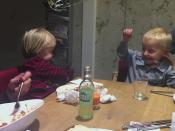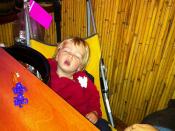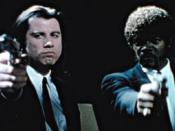Dialogue comes from the Greek word meaning to converse and usually describes a conversation between people. Dialogue has an interpersonal nature for who controls the conversation and whether certain voices are silenced.
Good morning/afternoon Miss and fellow students, today I am before you to analyse the different aspects of dialogue and how dialogue is used to gain power over others in relation to "Weapons Training", Stan's idea of fun and Vincent and Jules.
'Weapons Training' is a poem written in the form of an address being given to a group of new recruits by an experienced, roughly spoken, gruff mannered sergeant. The sergeant is seen as a dominant man, his manner is intimidating and his authoritative tone emphasises his power over his troops.
The tone becomes more hardened and colder throughout the poem, as the sergeant uses a blunt, confronting and imperious tone. This helps reinforce his message to the recruits regarding the implications of war and creates a sense of dominance.
For instance, the sergeant demands to hear "their eyeballs click and that fall of dandruff", this intimidates the troops, by demanding and forbidding them to interrupt, hence controlling and silencing the troops.
The rhetorical questions used in "Weapons Training" create techniques of fear, anger and frustration. The personalised attacks such as "Are you queer?" increases the sense of menace and vulgarity. Rhetorical questions are effective in characterising the sergeant's power and making the soldiers feel uneasy and nervous.
The idea of dialogue being a powerful technique is further explored in the Stan's idea of fun. Stan is a radio presenter and is depicted to have the characteristics of an arrogant and vulgar man as he receives a call from an Indian Man, Mr Singh.
Stan uses repetition to dominate the dialogue. He has constantly repeated the...


